A Plague of Pandemics
THIS YEAR, COVID-19 HAS TOUCHED EVERY PART OF THE WORLD, BUT HERE IN INDIANA, OHIO AND KENTUCKY, OUR NEIGHBORS HAVE BEEN FIGHTING A HOST OF ISSUES FOR DECADES.
It is estimated that more than 610,000 people don’t have adequate access to fresh food across Indianapolis, the Ohio Valley area and Louisville, KY. In all three regions, it is often communities of color and low-income families who live in areas with inadequate grocery stores, a high concentration of fast food options and a low density of alternative markets serving fresh, organic food. Although these issues have been present in these communities for more than a decade, the global health crisis has only exacerbated them.
In addition to concerns of food apartheid, police violence against people of color has created situations where communities are on edge. In Indianapolis, Black residents are still seeking justice for Dreasjon Reed, a 21-year-old military veteran who was shot and killed near a public library by police in May. In Louisville, the community is still reeling after Breonna Taylor was shot to death in her home on March 13. In a sense, these communities are fighting many pandemics: one of systemic racism, another of food insecurity and, most recently, COVID-19.
“White residents: Ask yourself if you’re willing to sacrifice some of your privilege for Black lives to matter. You cannot cut the light on and off at the same time, you can’t say you benefit from a system of inequities and not be willing to give up some of those benefits."
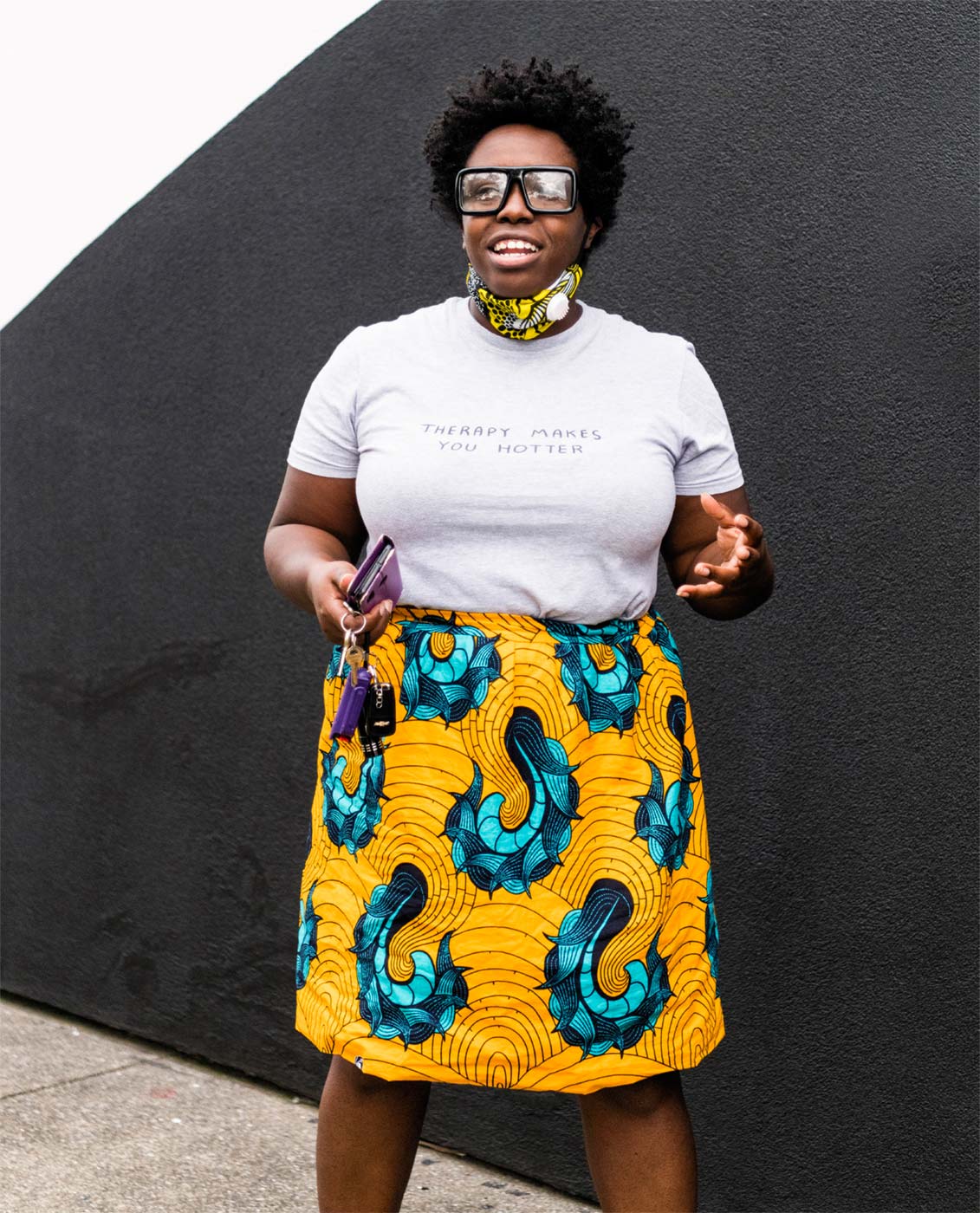
Photograph: ©2020, Andy Hyslop
“Start by looking at what Black organizers are doing, amplify that instead of creating your own things.”
— Shauntrice Martin, founder of The Bok Choy Project and #FeedTheWest in Louisville
A PILEUP OF NEED
Those three crises compounded each other to create a climate of even direr need for healthy food options in communities across the region. “One of the biggest things I think people misunderstand about food insecurity and how it affects low-income communities and communities of color is the assumption that people are to blame for their food insecurity,” says Kiana R. Trabue, MPH, Executive Director of Population Health Strategies at The Health Collaborative in Cincinnati. “Communities of color have fewer large supermarkets and small grocery stores than their white counterparts.”
And while proximity to retail stores offering a full selection of food items is a key part of the problem— neighborhoods without groceries are often called “food deserts”—the problem of healthy food access is a knotty one. “Food insecurity is a complex issue that includes access, affordability, education and capacity,” says Trabue’s colleague Lauren Bartoszek, PhD, Manager of Population Health Strategies at The Health Collaborative. “Someone who is food insecure may be close to a grocery store, but when their paycheck comes in they have to pay rent and utilities first, therefore leaving less money for the more expensive healthy food options. It isn’t that they don’t want to but they are forced to prioritize basic needs for which many other people do not have to do.”
Nor is the problem limited to simply feeding hungry people. Food and health are inextricably linked in a cause-and-effect relationship. “Eighty percent of health is determined by factors outside of the healthcare we receive,” Trabue says. “The conditions where we live, grow and age are often more impactful than the medical care we receive when it comes to staying healthy and improving health outcomes. These factors include housing, transportation, utilities, hunger and interpersonal violence. Racism serves as the root cause of many of these factors. As a community, we are realizing the vital need to address racism and other health-related social factors in order to improve our overall health outcomes.”
In the midst of so much struggle and inequality, community leaders, activists and entrepreneurs across the three-state region continue to work to find lasting solutions for neighborhoods with a great deal of need. These community members have not appeared overnight, they weren’t activated by a hashtag on social media and they’ve been aware of their neighbors’ struggles for healthy food and fight to dismantle oppressive systems well before COVID-19 reached the U.S. This is their story.
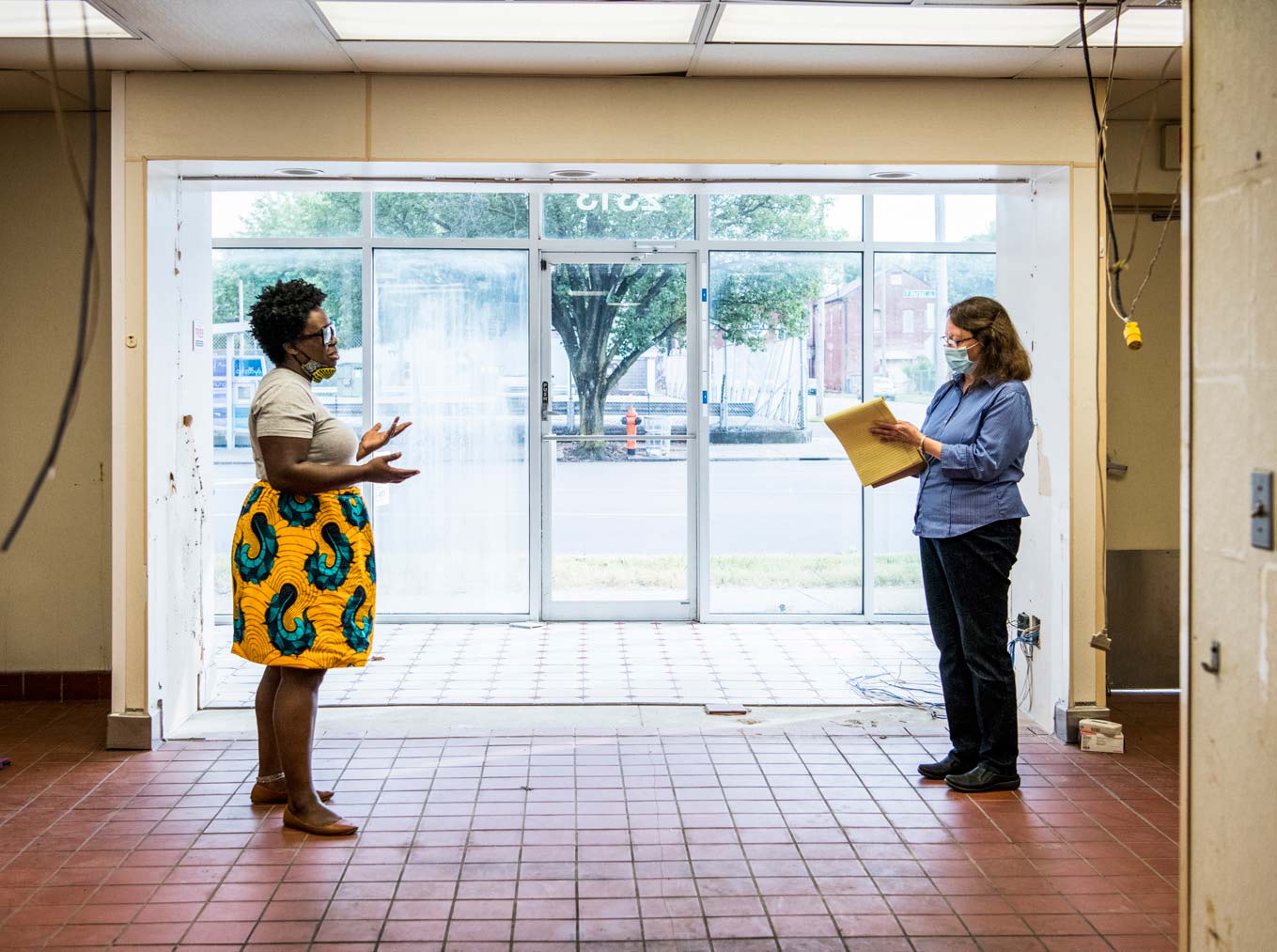
In Louisville, the #FeedTheWest program led by Shauntrice Martin (left) marshals 800 volunteers to provide food to 18,000 residents in west Louisville, a collection of almost a dozen neighborhoods challenged by a lack of fresh food. This former Domino’s Pizza building at 23rd and Market Streets is being renovated to serve as a grocery store. After surveying #FeedTheWest members, the store will be called Black Market KY LLC. Photograph: ©2020, Andy Hyslop.
GIVING IT ALL AWAY
When Indiana governor Eric Holcomb declared a stay-at-home order for the state, Hoosiers scrambled to the grocery store to grab what they could off the shelves, restaurant owners grappled with what to do with excess food, and business offices and schools that were still meeting in person moved to online.
In the midst of so much chaos, one establishment immediately turned its attention to the community: Cleo’s Bodega Grocery and Café. Located three miles northwest of downtown Indianapolis, Cleo’s is a new staple in an area that lost its only true grocery store, Double 8, in 2015. After opening at the end of 2019, COVID-19 was forcing the bodega to close just a few months later, but rather than worry about selling the items on their shelves and closing until the governor’s order was lifted, the Cleo’s staff took all of their food, boxed it up and gave it to the community.
“I’d say we bagged about $7,000 worth of groceries and gave it away to families during that first week [of the stay at home order],” says Sibeko Jywanza, Director of Food Justice at Flanner House, the nonprofit that owns and operates Cleo’s. “Almost immediately we transitioned into a food donation hub for the near northwest neighborhood. We utilized our building as a donation spot so people could bring food to these families. To this day, we’re still servicing families and delivering food. It was a no-brainer to us.”
Before Cleo’s opened to the public in 2019, residents had spent years going back and forth with elected officials about the need for a long-term solution to the lack of fresh, healthy food in the area. While the closure of Double 8 and Marsh grocery stores had affected other neighborhoods across the city, those neighborhoods have since seen other grocers like Fresh Market and Kroger move in to serve them. The near northwest side, which is predominately Black and low income, has not.
“The grocery store business is hard; more times than not you’re losing money, especially with produce because there’s a shelf life,” Jywanza explains. Referring to two Indy neighborhoods, one predominantly Black and the other white and affluent, he says: “If you have a choice of putting up a grocery store between the MLK area and Broad Ripple, you’re going to choose Broad Ripple; there’s community there, restaurants, night life, so as a business practice, it’s more profitable to put stores in places where you know people are going to go and purchase.”
With no other options to grocery shop nearby, residents often end up at Family Dollar or gas stations to buy what little groceries they can. Beyond serving the community through the bodega, Flanner House has a variety of programs built to teach children, adolescents and young adults how to grow, prepare, cook and sell healthy food. Flanner House has been serving the Indianapolis community for more than 100 years.
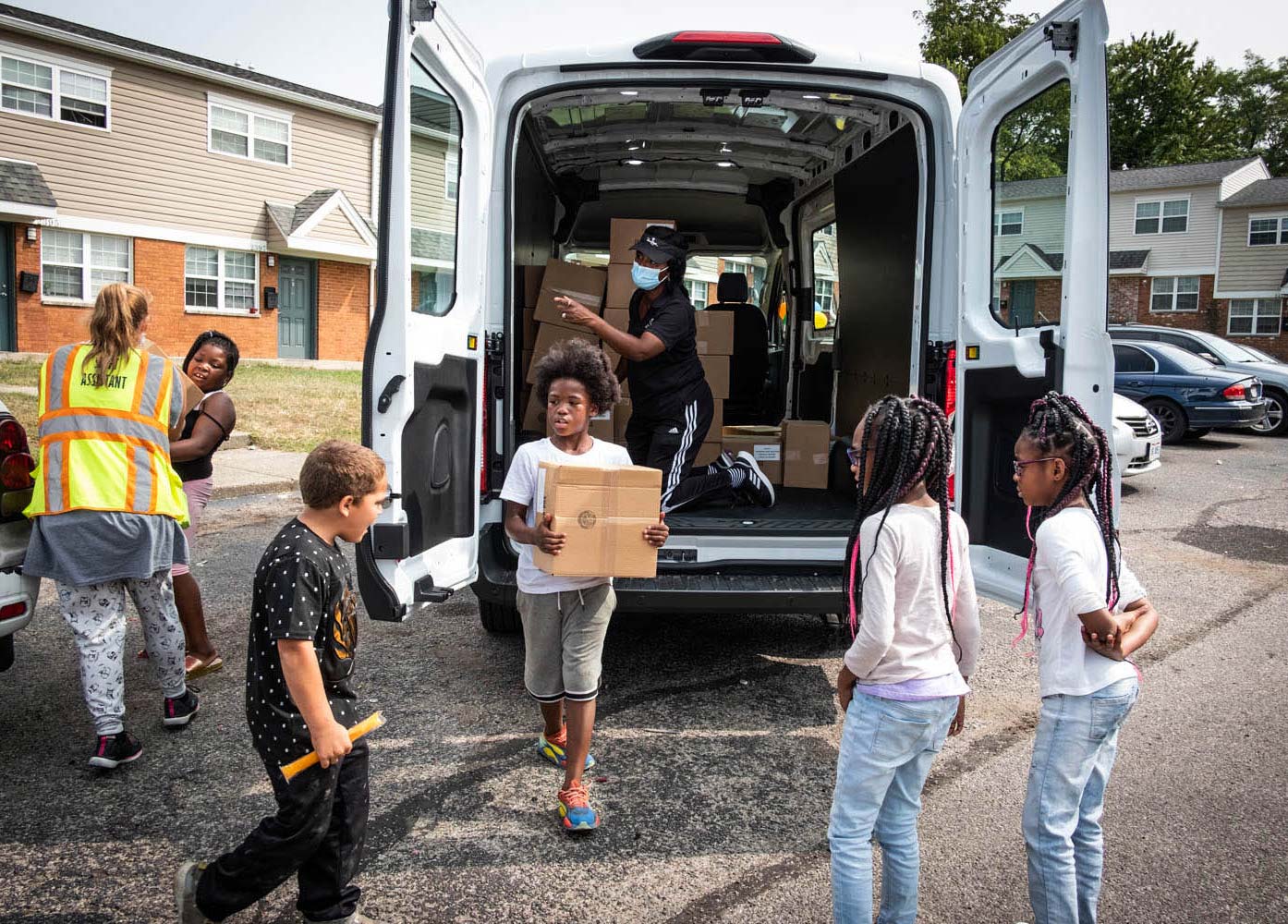
In Cincinnati, volunteers with the nonprofit Childhood Food Solutions distribute food boxes to families in the Roll Hill neighborhood. Photograph: ©2020, Michael Wilson.
SEPARATE, BUT NOT EQUAL
On June 2, 2020, in the Parkland neighborhood in Louisville, as employees and shoppers arrived at the Kroger store at 28th and Broadway, they were met with plywood-covered doors and windows. “They closed the store without warning because they were scared that Black people would riot,” Shauntrice Martin says. Martin is a Louisville resident and founder of #FeedThe West and The Bok Choy Project. Both projects highlight the discrepancies in produce at Kroger stores in underserved neighborhoods and procure food donations to provide fresh food to residents in these neighborhoods. Both initiatives are sponsored by the nonprofit Change Today, Change Tomorrow.
Later in the day, Kroger issued a statement saying the store would be closed indefinitely out of “an abundance of caution.” The city of Louisville had been grappling with the killing of Breonna Taylor and then David McAtee, the owner of YaYa’s BBQ. McAtee, whose business is located near the Kroger store, was shot and killed at YaYa’s BBQ during a protest where he was calling for justice for Taylor’s family. The outpouring of support for Taylor was varied, but consistent. On the day of Kroger’s announcement, the store had been looted, which led to the closure. But with the closure came consequences – not for Kroger, but for the Parkland neighborhood, an area of Louisville suffering from food insecurity. Kroger closing its doors didn’t just mean that residents had to go to another store a few blocks away—it meant that they were forced to travel across town to get groceries, in the middle of a global pandemic.
While Kroger’s doors were closed, Martin took the opportunity to press company leadership about their store practices. During her time in Louisville, she’s noticed a difference in Kroger stores in more affluent neighborhoods versus the boarded-up Kroger she frequented. “[Our Kroger] has very few, if any, organic options. Much of the produce is rotted or wilted,” she explains. “Workers are also paid a lot less in the predominately Black areas. So, Change Today, Change Tomorrow called them out on it. For the last few months we’ve been calling, emailing, and haven’t gotten a response.” Then, on August 2, 2020, Kroger commented to a post on Change Today, Change Tomorrow’s Facebook page. “All they said is that they’re committed to healthy food for all people. But we want action,” Martin says.
Martin has reached out to Kroger corporate numerous times; after no meaningful action, in August she went on a two-week hunger strike to call attention to Louisville’s food apartheid system, as she documented on social media under the username @BlackMarketKY and the hashtag #HungerStruck.
Cassia Herron, a grocery store organizer and urban planner, is taking a different approach. For the last decade, she’s been working from the belief that people have the answers to the problems of a community. As she watched grocery stores close in Black Louisville neighborhoods, she began to brainstorm solutions that were rooted in Black residents taking fiscal ownership of the food they want and need, rather than relying on big-name grocery stores. Herron helped to start Louisville Community Grocery, an organization that practices cooperative economics.
“What we’re trying to do is get folks to come in at all levels of income, everyone puts their money together and then we buy what we can and separate it accordingly,” Herron explains. “This will allow us to buy local, organic food, things that we can’t get in our neighborhood, directly from farmers. It’s also a great opportunity for [Black people] to own something for a small investment.”
Louisville Community Grocery is looking for about 2,000 investors who can be part of the creation of the community grocery stores for about $150 per person. The city is also offering an opportunity for the organization to bid on up to $3.5 million in grant funding to start these stores.
“The co-op model allows for the community at large to determine and control what the future of their community looks like.”
— Kenya Baker, community engagement director of Co-op Dayton
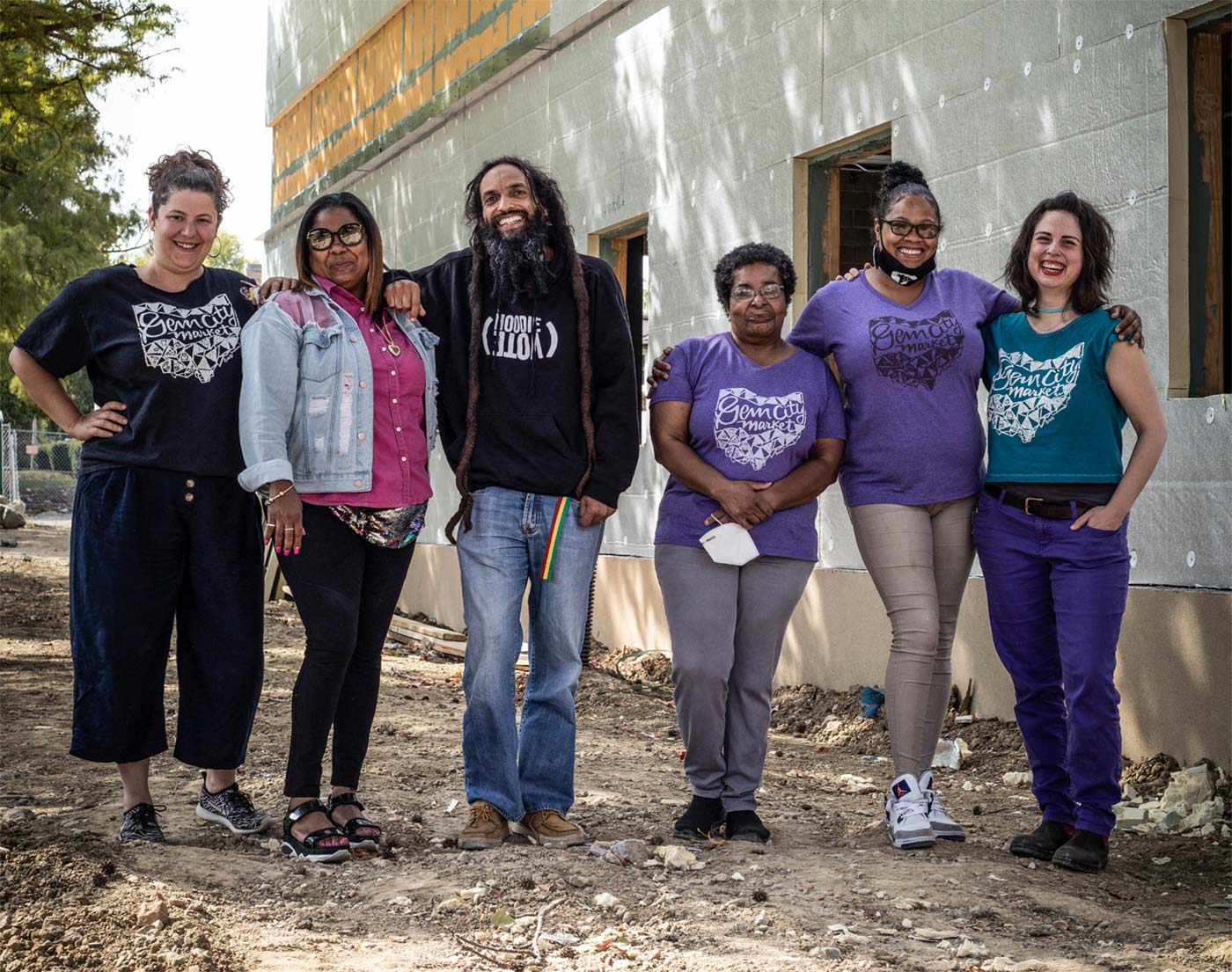
(From left) In Dayton, OH, Lela Klein, Kenya Baker, amaha sellassie, Corinne Sanders, Shavelta Harding and Rachel Dominguez-Benner of Gem City Market stand outside the co-op grocery that’s currently under construction. More than 2,700 member-owners have signed on to support the market’s development. Photograph: ©2020, Michael Wilson.
THE GROCERY STORE MOVEMENT
In Dayton, OH, Gem City Market is taking a similar approach to Louisville Community Grocery in order to bring more grocery options to areas of the city. In 2015, residents began meeting and discussing the outcomes of Daytonians based on race, ZIP code, education and other indicators. Residents combed through opportunity mapping research compiled by Dayton and Montgomery County’s Epidemiology Section of Public Health. In reading through the research, community members decided that tackling the issues of food access was most important. Thus, Gem City Market was born.
Gem City Market is a plan to bring healthy, locally sourced food to lower Salem Avenue near downtown Dayton. Like Louisville Community Grocery, Gem City will be a co-op that is a community centered, full-service grocery store. Kenya Baker, community engagement director of Co-op Dayton, Gem City’s incubator, says it’s important that this store is a co-op for a few reasons. “The co-op model allows for the community at large to determine and control what the future of their community looks like,” she explains. “This model doesn’t rely on profitability or market dips. It creates shared ownership and governance, allowing the community to build their destiny and shape their access.”
The market won’t just be a grocery store. Similar to Cleo’s Bodega, the space will house a café, a clinic and a teaching kitchen. “We believe that the grocery store is a movement. Capitalism programs us to work independently and competitively. The cooperative model forces us to work together collectively. It affords us the opportunity to pool resources, intellectual capital and interdependence,” Baker says.
The organization broke ground on the future location of the store in September 2019, and they anticipate Gem City Market will be open to the public by January 2021. To date, the market has more than 2,700 community member-owners.
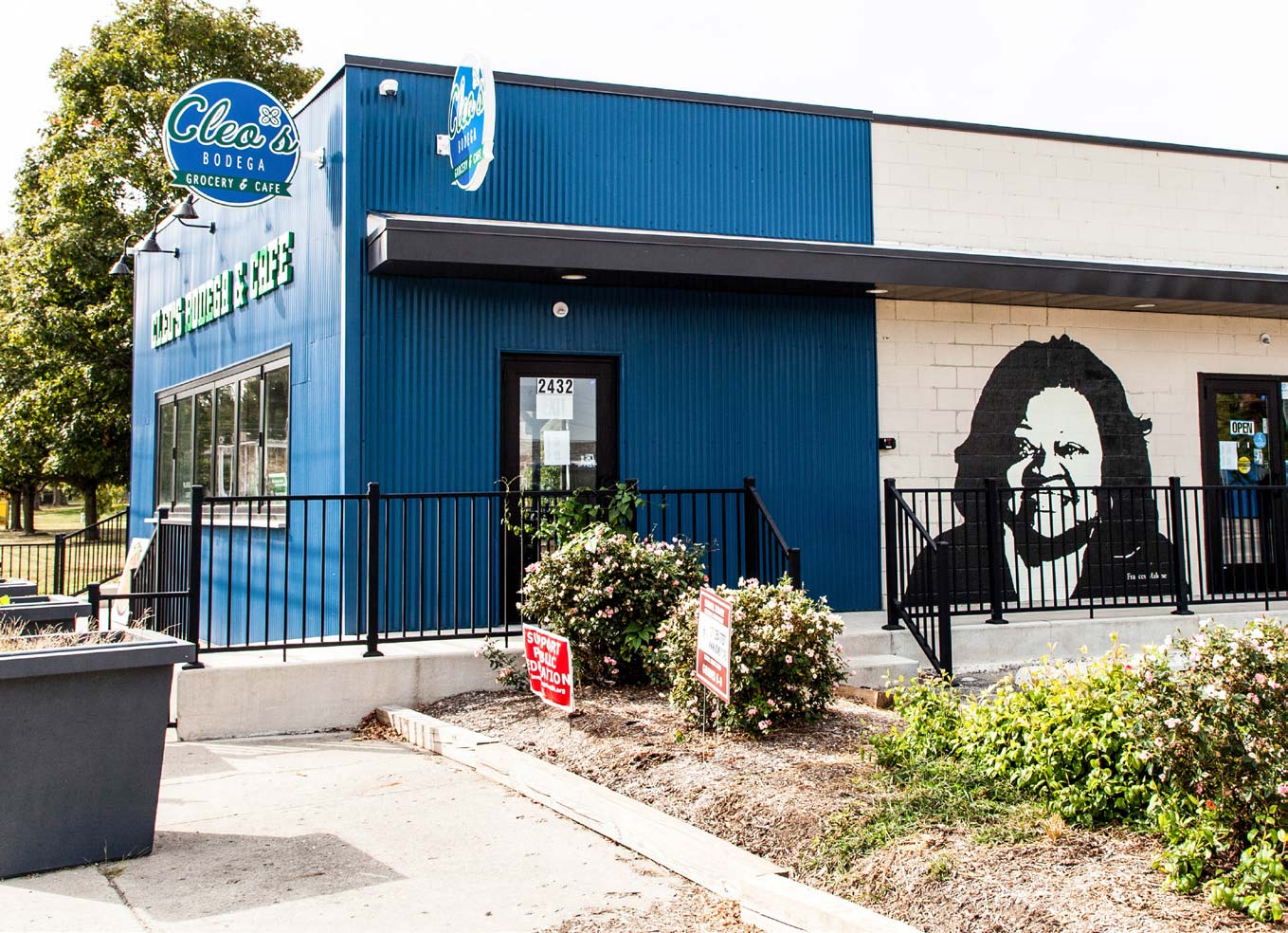
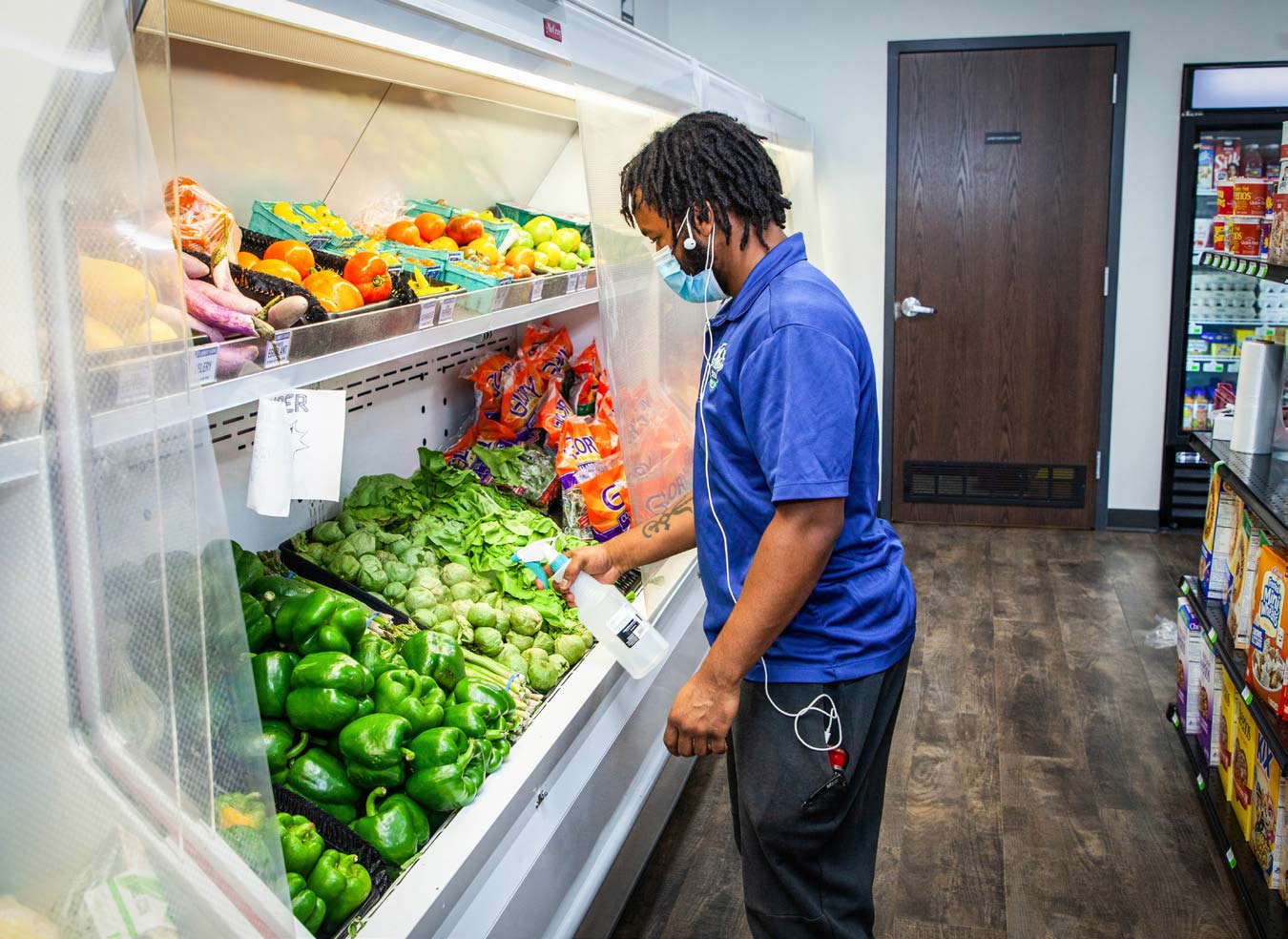
In Indianapolis, Cleo’s Bodega brings fresh produce and groceries to the city’s near-northwest neighborhood, which is home to predominantly Black and Hispanic residents. The store has a backyard garden, and some of the produce offered in the cooler (bottom) comes from that plot. Photograph: ©2020, Faith Blackwell.
A MOVEMENT, NOT A MOMENT
In the midst of a global health crisis that is disproportionately affecting Black and brown communities, residents of color in these three communities and across the country are also being forced to deal with the systemic and consistent violence against their communities by police. In a time when much of the country is watching and listening, because a pandemic is forcing them to, the response has been to support Black-owned businesses more, or share resources on social media. While these efforts are crucial and important, when asked how these three regions can support these efforts, Martin of #FeedTheWest says amplification, and not appropriation, is key.
“Start by looking at what Black organizers are doing, amplify that instead of creating your own things,” she says. “White residents: Ask yourself if you’re willing to sacrifice some of your privilege for Black lives to matter. You cannot cut the light on and off and the same time, you can’t say you benefit from a system of inequities and not be willing to give up some of those benefits.”
Jywanza, Cleo’s manager, wants communities that aren’t affected by police brutality, food apartheid and other issues to understand that they aren’t new. “Donations are always needed, whether that’s money, time or other resources,” he says. “In this new climate, a lot of people are aware of some of the things going on in our communities. Understand that food access isn’t the only issue and that none of these issues are new. Understand that a lot of these things were built this way on purpose in order to make this country what it is. If you really want to make a change, you have to understand that you may have to give up some things so others can get a fair shake at life.”
“If you really want to make a change, you have to understand that you may have to give up some things so others can get a fair shake at life.”
— Sibeko Jywanza, Director of Food Justice at Flanner House in Indianapolis
Consider donating to these nonprofit efforts to relieve food insecurity:
OHIO
Gem City Market (Dayton)
GemCityMarket.com
Childhood Food Solutions (Cincinnati)
ChildhoodFoodSolutions.org
La Soupe (Cincinnati)
LaSoupe.org
Healthy Harvest Mobile Market (Cincinnati)
HealthyHarvestMobileMarket.com
INDIANA
Cleo’s Bodega at Flanner House (Indianapolis)
FlannerHouse.org
Indy Hunger Network
IndyHunger.org
Second Helpings (Indianapolis)
SecondHelpings.org
Feeding Indiana’s Hungry
FeedingIndianasHungry.org
KENTUCKY
Northern Kentucky Community Action Commission
NKCAC.org
Change Today, Change Tomorrow (Louisville)
Change-Today.org
Bok Choy Project (Louisville)
RootCauseResearch.org
Louisville Community Grocery
LouFoodCoop.com
Black Market KY (Louisville)
BlackMarketKY.com
FoodChain (Lexington)
FoodChainLex.org




